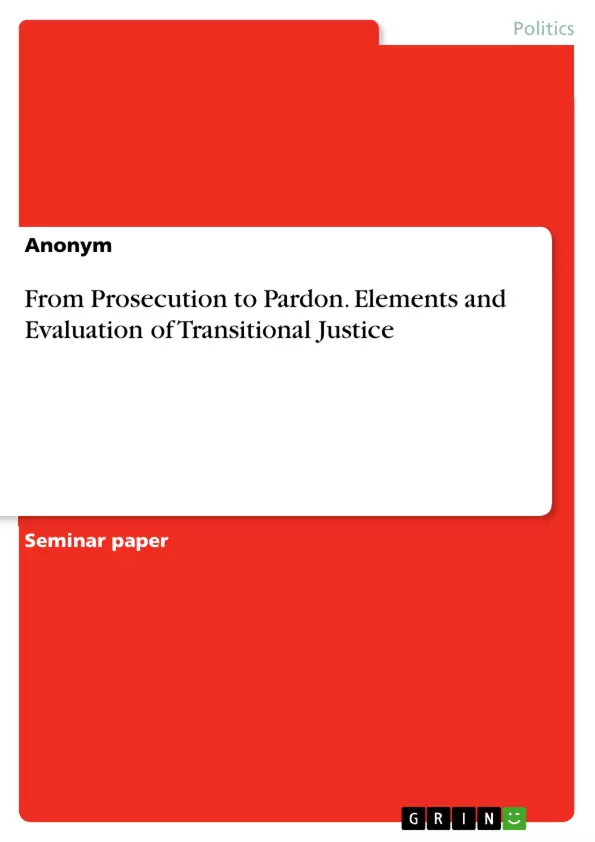The main purpose of this paper is to underline a special aspect of justice: the so called transitional justice [TJ], which is applied in cases of political transition, especially in post-conflict societies which have witnessed mass-violence, human rights abuses and cruelties of authoritarian regimes.
This paper is aimed to analyse and evaluate transitional justice in terms of its contribution to peace-building. The main argument is that transitional justice enables a more holistic approach which takes the restoration and reconciliation of the post-conflict societies into account, as well as the links between dealing with the past and building peace for the future.
Inhaltsverzeichnis (Table of Contents)
- Introduction
- What is Transitional Justice?
- What kind of Justice?
- Approaches / Methods of Transitional Justice
- Conclusion
Zielsetzung und Themenschwerpunkte (Objectives and Key Themes)
This paper examines the concept of transitional justice (TJ) and its application in post-conflict societies. It aims to analyze and evaluate TJ's contribution to peace-building, arguing that it enables a holistic approach to reconciliation and restoration, linking past injustices to future peace.
- The nature and elements of transitional justice
- Different approaches and methods of transitional justice
- The relationship between transitional justice and peace-building
- The role of retributive and restorative justice in transitional contexts
- The importance of addressing past human rights abuses and trauma
Zusammenfassung der Kapitel (Chapter Summaries)
- Introduction: This section introduces the concept of transitional justice (TJ) as a specific form of justice applied during political transitions, particularly in post-conflict societies marked by mass violence and human rights abuses. The paper aims to analyze TJ's contribution to peace-building, highlighting its holistic approach to restoration and reconciliation.
- What is Transitional Justice?: This chapter explores the definition and characteristics of TJ, emphasizing its adaptation to societies undergoing transformation after periods of human rights violations. It differentiates TJ from traditional forms of justice by incorporating truth-seeking, reparation, and broader approaches to justice beyond prosecution.
- What kind of Justice?: This section delves into different concepts of justice relevant to transitional societies, focusing on retributive and restorative justice. It defines these concepts, outlines their underlying principles, and compares their approaches to addressing crime and achieving justice.
Schlüsselwörter (Keywords)
Key terms and topics covered in this paper include transitional justice, peace-building, post-conflict societies, human rights abuses, reconciliation, restoration, retributive justice, restorative justice, truth-seeking, reparation, and prosecution.
Frequently Asked Questions
What is Transitional Justice (TJ)?
Transitional justice refers to the set of judicial and non-judicial measures implemented by societies to redress legacies of massive human rights abuses during political transitions.
How does Transitional Justice contribute to peace-building?
It enables a holistic approach that links dealing with the past to building a peaceful future through reconciliation, restoration, and truth-seeking.
What is the difference between retributive and restorative justice?
Retributive justice focuses on punishment and prosecution, while restorative justice aims at healing relationships and reintegrating victims and offenders into society.
What methods are used in Transitional Justice?
Common methods include truth commissions, reparations programs, institutional reforms, and criminal prosecutions.
Why is addressing past human rights abuses necessary?
Addressing past trauma is crucial for long-term stability, preventing future conflicts, and establishing the rule of law in post-conflict societies.
- Citation du texte
- Anonym (Auteur), 2008, From Prosecution to Pardon. Elements and Evaluation of Transitional Justice, Munich, GRIN Verlag, https://www.grin.com/document/346844



